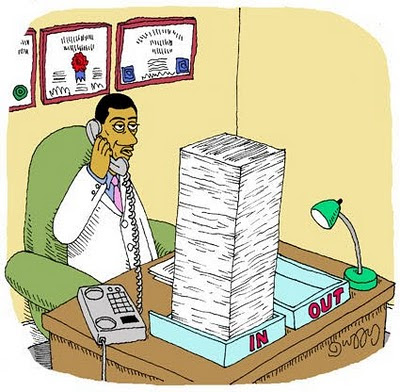December 7th, 2010 by Bryan Vartabedian, M.D. in Better Health Network, Opinion
No Comments »

 We all want technology to improve communication between doctors and patients. We fantasize that social tools will open doors and bridge the expanding divide between doctors and patients.
We all want technology to improve communication between doctors and patients. We fantasize that social tools will open doors and bridge the expanding divide between doctors and patients.
I’m wondering if it’s a case of unicorns and rainbows: Fancy new tools to do the old thing in a less-effective way. I’m guessing that if Facebook was the old platform for doctor-patient dialog and the telephone was invented this year, everyone would be clamoring to use the phone (“Dude, this is amazing…you can hear them talk.”)
I like the telephone. Written copy misses intonation, timing, pitch, and all the other rich elements of human speech. Subtle changes in a parent’s voice tell me if I’ve made my point and exactly how I need to proceed [with caring for their child]. Unspoken words on a screen are so one-dimensional.
Of course, email has a tightly-defined place in patient communication. And real-time social interaction between patient and clinic will evolve to have a clear role in patient care. But for now, the phone remains one of the most effective tools for helping doctor and patient really understand one another.
[Image credit: Cemagraphics]
*This blog post was originally published at 33 Charts*
December 6th, 2010 by Dinah Miller, M.D. in Better Health Network, Health Policy, News
No Comments »


 The American Medical Association (AMA) had a press release [recently] announcing findings from their survey on the impact of insurance company preauthorization policies.
The American Medical Association (AMA) had a press release [recently] announcing findings from their survey on the impact of insurance company preauthorization policies.
Surprisingly, they discovered that these policies use physician time and delay treatment. It’s funny, because preauthorization policies were designed to save money. And I imagine they do, for the insurer, but they cost money for everyone else. Read more »
*This blog post was originally published at Shrink Rap*
December 6th, 2010 by Happy Hospitalist in Better Health Network, Health Policy, Opinion
No Comments »

Looking for a great story about the state of hospital care in America? Look no further. The Health Care Blog has a great article by hospitalist Dr. Robert Wachter that sums it up nicely. It’s about money. Thats how hospitals get paid. That’s how everyone gets paid. It will always be about money. We don’t pay doctors, nurses, or administrators with smiley faces and candy canes. We pay them with cold hard cash. For example:
One of the physicians, an invasive cardiologist, stopped me in my tracks. “Actually, our hospital already provides a tremendous amount of support and feedback,” he said. “When I perform a catheterization or angioplasty, a hospital staff member watches the entire procedure, she sometimes suggests mid-course corrections, and as soon as I’m done she provides me detailed feedback on whether I met all the best practice standards.”
“Wow,” I said. “Your hospital is really taking quality seriously!”
“Oh,” he replied, mischievous smile on his face, “she’s not from the quality department. She’s from the billing department.”
The question should not be how do you get profit out of medicine. The question should be how do you get quality into profit. We need profit. The last thing you want in this country is universal VA health care. Trust me on that. Americans would never stand for it. But how do you get both? Read more »
*This blog post was originally published at The Happy Hospitalist*
December 4th, 2010 by Elaine Schattner, M.D. in Better Health Network, Health Tips, Opinion, True Stories
1 Comment »

To complain or “be good” is an apparent dilemma for some patients with serious illness.
Yesterday I received an email from a close friend with advanced breast cancer. She’s got a lot of symptoms: Her fatigue is so overwhelming she can’t do more than one activity each day. Yesterday, for example, she stayed home all day and did nothing because she was supposed to watch a hockey game in the evening with her teenage son and other family members. Her voice is weak, so much it’s hard to talk on the phone. She has difficulty writing, in the manual sense — meaning she can’t quite use her right arm and hand properly.
“It’s something I would never mention to the doctor because it is very subtle,” she wrote. “But it has not improved and if anything has worsened over time.”
There are more than a few possible medical explanations for why a person who’s receiving breast cancer therapy might not be able to use her right arm. But that’s not the point of today’s lesson. What’s noteworthy here is that the patient — an educated, thoughtful woman who’s in what should be the middle of her life and is trying as best she can to survive — doesn’t think these symptoms are worth mentioning. Read more »
*This blog post was originally published at Medical Lessons*
December 3rd, 2010 by BobDoherty in Better Health Network, Health Policy, News, Opinion
No Comments »

In assessing the “best and worst” of the recommendations from the National Commission on Fiscal Responsibility, Washington Post blogger Ezra Klein accuses the Commission of “cowardice” in addressing healthcare spending:
“The plan’s healthcare savings largely consist of hoping the cost controls . . . and various demonstration projects in the new healthcare law work and expanding their power and reach. . . In the event that more savings are needed, they throw out a grab bag of liberal and conservative policies . . . but don’t really put their weight behind any. . .[their] decision to hide from the big questions here is quite disappointing . . . ”
Pretty harsh words, considering that in other respects Klein gives the Commission high marks. But I think there is a lot more to the Commission’s recommendations on healthcare spending than meet’s (Klein’s) eyes, even though I have my own doubts about the advisability and political acceptability of many of them. Read more »
*This blog post was originally published at The ACP Advocate Blog by Bob Doherty*
![]() We all want technology to improve communication between doctors and patients. We fantasize that social tools will open doors and bridge the expanding divide between doctors and patients.
We all want technology to improve communication between doctors and patients. We fantasize that social tools will open doors and bridge the expanding divide between doctors and patients.















